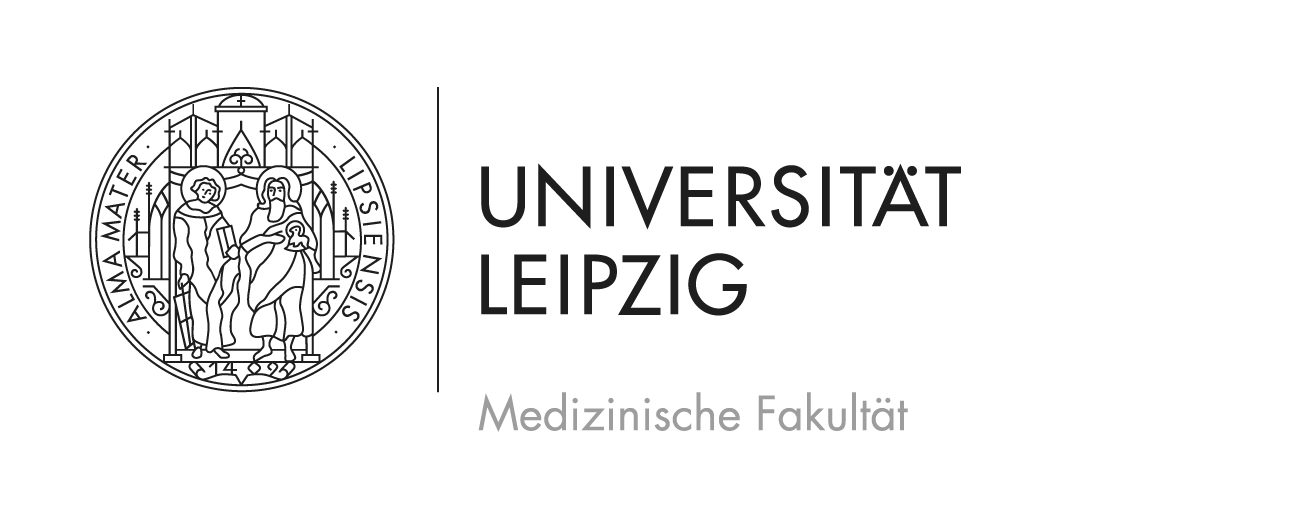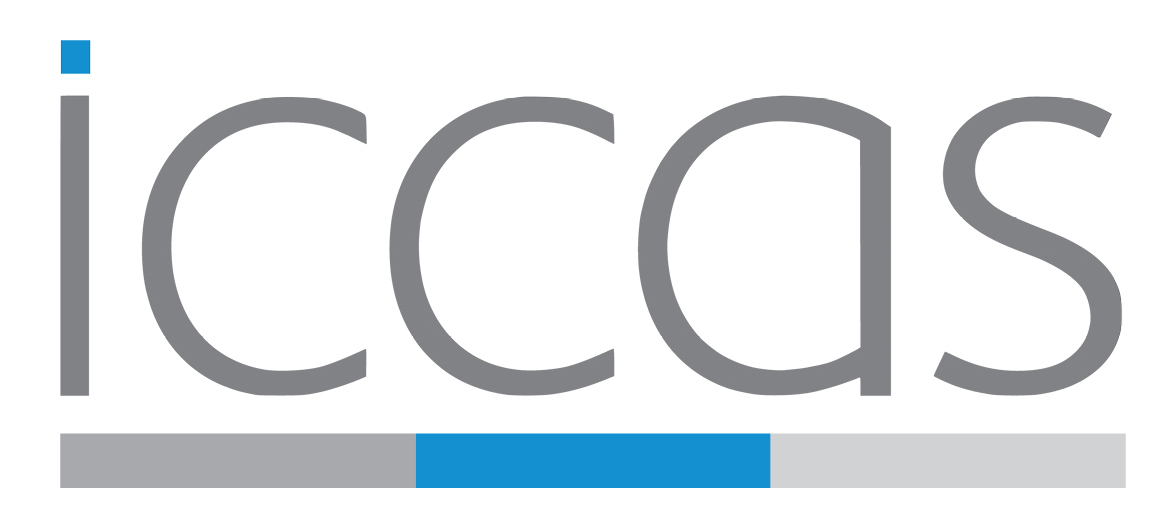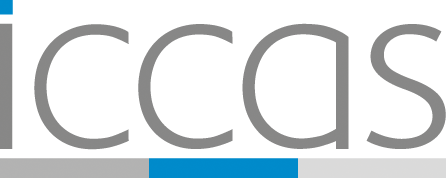11.12.2013
 ICCAS auf der ICBME 2013
ICCAS auf der ICBME 2013
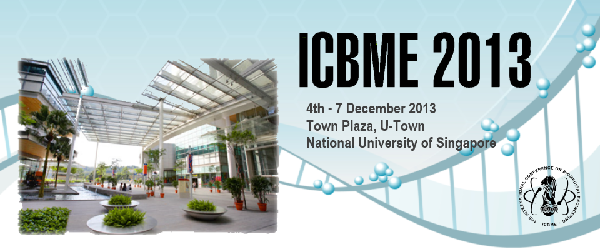 Die Nationale Universität Singapur war in diesem Jahr Austragungsort der 15. Internationalen Konferenz für Biomedizinische Technik (ICBME), auf der Dr. Stefan Bohn den Vortrag “An interoperability architecture for networked medical devices and its application to neurosurgery” hielt. Darin stellte der Diplomingenieur die am ICCAS entwickelte offene Integrationsplattform für die Vernetzung medizinischer Geräte im OP vor, welche bei Wissenschaftlern aus den USA, Frankreich und Deutschland auf großes Interesse stieß. Zudem leitete Dr. Bohn als Session-Chair die Sitzung „Assisted Technologies“.
Die Nationale Universität Singapur war in diesem Jahr Austragungsort der 15. Internationalen Konferenz für Biomedizinische Technik (ICBME), auf der Dr. Stefan Bohn den Vortrag “An interoperability architecture for networked medical devices and its application to neurosurgery” hielt. Darin stellte der Diplomingenieur die am ICCAS entwickelte offene Integrationsplattform für die Vernetzung medizinischer Geräte im OP vor, welche bei Wissenschaftlern aus den USA, Frankreich und Deutschland auf großes Interesse stieß. Zudem leitete Dr. Bohn als Session-Chair die Sitzung „Assisted Technologies“.
Neben Vorträgen aus den Bereichen Diagnostische Medizingeräte, Bildgebung, Medizinische Assistenzsysteme und Plenar-Talks zur Integration von Systemen der computerassistierten Chirurgie und Robotik beeindruckte besonders ein Beitrag über den Entwicklungsstand der Zusammenarbeit von Mensch und Roboter in der Rehabilitation und in nicht-medizinischen Forschungsgebieten.
 This year, the National University of Singapore was venue for the 15th International Conference on Biomedical Engineering (ICBME). There, Dr. Stefan Bohn gave the lecture “An interoperability architecture for networked medical devices and its application to neurosurgery” to present the open integration platform for networking of medical devices in the operating room, developed at ICCAS. The presentation has met with great interest among scientists from USA, France and Germany. In addition, Dr. Bohn served as session chair the meeting “Assisted Technologies”.
This year, the National University of Singapore was venue for the 15th International Conference on Biomedical Engineering (ICBME). There, Dr. Stefan Bohn gave the lecture “An interoperability architecture for networked medical devices and its application to neurosurgery” to present the open integration platform for networking of medical devices in the operating room, developed at ICCAS. The presentation has met with great interest among scientists from USA, France and Germany. In addition, Dr. Bohn served as session chair the meeting “Assisted Technologies”.
Besides lectures from the fields of diagnostic medical devices, imaging, medical assistance systems and plenary talks about the integration of systems of computer-assisted surgery and robotics, particularly a lecture about the stage in development of the cooperation between humans and robots in rehabilitation and non-medical research was very impressive.
 DICOM WG24 Meeting auf der RSNA-Konferenz 2013
DICOM WG24 Meeting auf der RSNA-Konferenz 2013
 Philipp Liebmann reiste Anfang Dezember 2013 zum DICOM WG24 Meeting nach Chicago (IL, USA), das im Rahmen der 99. Jahrestagung der Radiological Society of North America (RSNA) stattfand.
Philipp Liebmann reiste Anfang Dezember 2013 zum DICOM WG24 Meeting nach Chicago (IL, USA), das im Rahmen der 99. Jahrestagung der Radiological Society of North America (RSNA) stattfand.
Der Nachwuchswissenschaftler aus dem Forschungsfeld Standards (STD) ist bereits zum fünften Mal Mitorganisator des DICOM WG 24 Treffens, dessen Vorsitz Prof. Dr. Heinz U. Lemke ausübt. Neben dem Forschungsaustausch mit Partnern der DICOM WG 24 Gruppe, wie Philips, GE und Medtronic, stand die Weiterentwicklung des Digital Imaging and Communications in Medicine (DICOM) Standards im Vordergrund der Diskussionen.
 In early December 2013, Philipp Liebmann traveled to the DICOM WG24 Meeting, which took place in Chicago (IL, USA) as part of the 99th Annual Meeting of the Radiological Society of North America (RSNA).
In early December 2013, Philipp Liebmann traveled to the DICOM WG24 Meeting, which took place in Chicago (IL, USA) as part of the 99th Annual Meeting of the Radiological Society of North America (RSNA).
The young scientist of the research area Standards (STD) was co-organizer of the DICOM WG 24 Meeting for the fifth time, which is chaired by Prof. Dr. Heinz U. Lemke. In addition to the research exchange with partners from the DICOM WG 24 Group, such as Philips, GE and Medtronic, the development of the Digital Imaging and Communications in Medicine (DICOM) Standard was in main focus of the discussions.
09.12.2013
 Sandra von Sachsen als Gastreferentin auf der MAC 2013
Sandra von Sachsen als Gastreferentin auf der MAC 2013
Im Klinikum rechts der Isar fand Ende November 2013 zum dritten Mal die Munich Aortic & Carotid Conference (MAC) statt. Auf der Veranstaltung hielt Sandra von Sachsen als geladene Referentin einen Vortrag zum „Medical Postprocessor for stent graft comparison“. Damit bereicherte sie den Themenbereich, der sich mit Innovationen in der biomechanischen Bildgebung, Modellierung und Simulation für die Aorta befasste.
Der Medical Postprocessor ist ein Softwaremodul, mit dem die Ergebnisse einer Finite-Elemente-Analyse zum Stentgraftverhalten ausgewertet werden. Frau von Sachsen stellte im Rahmen des Vortrags die Softwarefunktionalitäten vor und sprach über die Ergebnisse einer Benutzerstudie, die zur Diskussion der angestrebten simulationsbasierten Auswahl von Endoprothesen durchgeführt wurde.
At the end of November 2013, the Munich Aortic & Carotid Conference (MAC) took place for the third time at Klinikum rechts der Isar. There, Sandra von Sachsen gave an invited lecture on “Medical Post Processor for stent-graft comparison” and hence enriched the subject area dealing with innovations in biomechanical imaging, modeling and simulation for the aorta.
The Medical Post Processor is a software module that evaluates the results of a finite element analysis for stent graft behavior. As part of the lecture, von Sachsen presented the software functionalities and spoke about the results of a user study that was conducted to discuss the intended simulation-based selection of endoprostheses.
04.12.2013
 Posterpreis der CURAC Jahrestagung 2013 geht ans ICCAS
Posterpreis der CURAC Jahrestagung 2013 geht ans ICCAS
 Die 12. Jahrestagung der Deutschen Gesellschaft für Computer- und Roboterassistierte Chirurgie fand in diesem Jahr vom 28.-30. November in Innsbruck statt. Das ICCAS war mit Prof. Dr. Thomas Neumuth, Dr. Kerstin Denecke und Dr. Claire Chalopin vertreten.
Die 12. Jahrestagung der Deutschen Gesellschaft für Computer- und Roboterassistierte Chirurgie fand in diesem Jahr vom 28.-30. November in Innsbruck statt. Das ICCAS war mit Prof. Dr. Thomas Neumuth, Dr. Kerstin Denecke und Dr. Claire Chalopin vertreten.
Dr. Chalopin referierte über eine Methode zur Validierung von Ultraschall-Perfusion in der Hirntumorchirurgie, die in Zusammenarbeit mit dem Institut für Simulation und Graphik (ISG) der Otto von Guericke Universität Magdeburg und der Klinik und Poliklinik für Neurochirurgie des Universitätsklinikums Leipzig entwickelt wurde.
Gratulation geht an Stefan Franke! Der Diplominformatiker aus dem Forschungsfeld Modellbasierte Automation und Integration (MAI) gewann den diesjährigen Posterpreis der CURAC Jahrestagung mit seinem Beitrag „A surgical assistance system for Transcatheter Aortic Valve Implantation based on a Magic Lens concept“. Darin wird ein intraoperatives Assistenzsystem vorgestellt, das dem Operateur anatomische Strukturen bei der Durchführung minimalinvasiver Eingriffe am Herzen direkt am Patienten darstellt.
 This year, the 12th Annual Conference of the German Society for Computer and Roboter-Assisted Surgery (CURAC) was held in Innsbruck from 28 to 30 November. ICCAS was represented by Professor Thomas Neumuth, Dr Kerstin Denecke and Dr Claire Chalopin.
This year, the 12th Annual Conference of the German Society for Computer and Roboter-Assisted Surgery (CURAC) was held in Innsbruck from 28 to 30 November. ICCAS was represented by Professor Thomas Neumuth, Dr Kerstin Denecke and Dr Claire Chalopin.
Dr Chalopin introduced a “Method for the evaluation of ultrasound perfusion for brain tumor surgery”, which was developed in collaboration with the Department of Simulation and Graphics at Otto von Guericke University Magdeburg and the Department of Neurosurgery at Leipzig University Hospital.
Congratulations go to Stefan Franke! The graduated computer scientist from the research field Model -based Automation and Integration (MAI) won this year’s Poster Award of CURAC Annual Conference with his contribution “A surgical assistance system for Transcatheter Aortic Valve Implantation based on a Magic Lens concept”. It presents an intraoperative assistance system which visualizes anatomical structures under the patient’s skin during the implementation of minimally invasive cardiac interventions.
14.11.2013
 Wissenschaftsdelegation aus Neuseeland zu Gast am ICCAS
Wissenschaftsdelegation aus Neuseeland zu Gast am ICCAS
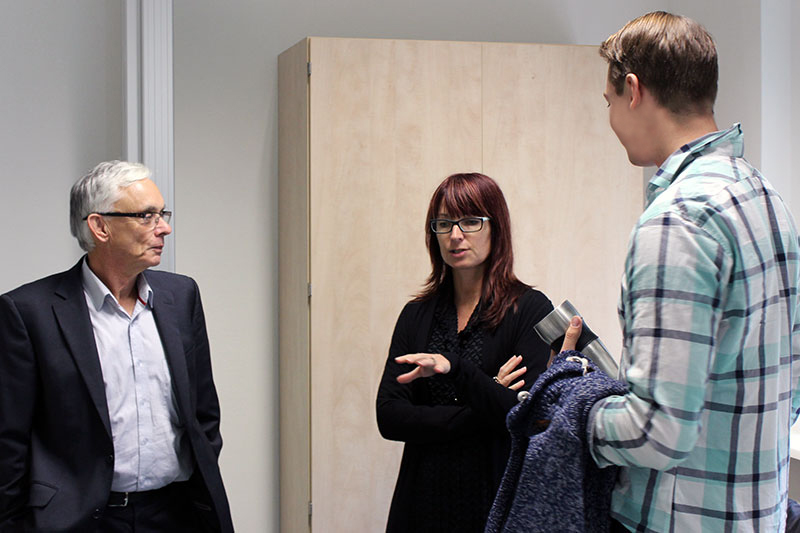 Das ICCAS war am Freitag, dem 8. November 2013 Station der FRIENZ Study Group Tour, bei der Wissenschaftler aus Neuseeland zukünftige Kooperationspartner ausloten. Dr. Robyn Whittaker und Malcolm Pollok vom National Institute for Health Innovation (Nihi) der Universität Auckland stellten den ICCAS-Mitarbeitern ihre Expertisen und Forschungsinteressen auf dem Gebiet der medizinischen Informatik und Anwendungstechnik vor. Im Gegenzug machte Dr. Kerstin Denecke die beiden Gäste mit den Forschungsthemen des ICCAS vertraut. Beide Seiten werden nun genauer prüfen, ob es Überschneidungen und Möglichkeiten für künftige Kollaborationen gibt, die in einem gemeinsamen Projekt münden könnten.
Das ICCAS war am Freitag, dem 8. November 2013 Station der FRIENZ Study Group Tour, bei der Wissenschaftler aus Neuseeland zukünftige Kooperationspartner ausloten. Dr. Robyn Whittaker und Malcolm Pollok vom National Institute for Health Innovation (Nihi) der Universität Auckland stellten den ICCAS-Mitarbeitern ihre Expertisen und Forschungsinteressen auf dem Gebiet der medizinischen Informatik und Anwendungstechnik vor. Im Gegenzug machte Dr. Kerstin Denecke die beiden Gäste mit den Forschungsthemen des ICCAS vertraut. Beide Seiten werden nun genauer prüfen, ob es Überschneidungen und Möglichkeiten für künftige Kollaborationen gibt, die in einem gemeinsamen Projekt münden könnten.
Die FRIENZ Study Group Tour ist eine Initiative der Europäischen Kommission und dem New Zealand Ministry of Business, Innovation and Employment, die zur Erleichterung von wissenschaftlichen Kooperationen zwischen Europa und Neuseeland ins Leben gerufen wurde. Das Team um Dr. Robyn Whittaker und Malcolm Pollock umfasst Forscher und Pädagogen auf den Gebieten der medizinischen Informatik, Systeme und Strategie, klinische Anwendungen, klinische Studien und Telemedizin.
 On Friday 8 November 2013 the ICCAS was one station of the Frienz Study Group tour, where scientists from New Zealand explore future cooperation partners. Dr. Robyn Whittaker and Malcolm Pollok from the National Institute for Health Innovation (Nihi) at the University of Auckland presented their expertise and research interests in the field of medical computer science and application technology to the ICCAS employees. Dr. Kerstin Denecke in turn made the two guests familiar with the research themes of the ICCAS. Both sides will now examine more closely whether there are overlaps and opportunities for future collaborations that could lead to a common project.
On Friday 8 November 2013 the ICCAS was one station of the Frienz Study Group tour, where scientists from New Zealand explore future cooperation partners. Dr. Robyn Whittaker and Malcolm Pollok from the National Institute for Health Innovation (Nihi) at the University of Auckland presented their expertise and research interests in the field of medical computer science and application technology to the ICCAS employees. Dr. Kerstin Denecke in turn made the two guests familiar with the research themes of the ICCAS. Both sides will now examine more closely whether there are overlaps and opportunities for future collaborations that could lead to a common project.
The Frienz Study Group tour is an initiative of the European Commission and the New Zealand Ministry of Business, Innovation and Employment, which was initiated to support scientific cooperation between Europe and New Zealand. The team led by Dr. Robyn Whittaker and Malcolm Pollock includes researchers and educators in the fields of medical computer science, systems and strategy, clinical applications, clinical trials and telemedicine.
28.10.2013
 Kolloquiumsvortrag von Dr. Nicolas Gerber verschoben
Kolloquiumsvortrag von Dr. Nicolas Gerber verschoben
Der für den 29. Oktober 2013 anberaumte Kolloquiumsvortrag von Dr. Nicolas Gerber zum Thema “Computer Assisted Planning and Image Guided Surgery Systems for Implantable Hearing Systems“ wird verschoben. Er findet am 03. Dezember 2013 um 13:30 Uhr im ICCAS-Konferenzraum statt.Der für den 29. Oktober 2013 anberaumte Kolloquiumsvortrag von Dr. Nicolas Gerber zum Thema “Computer Assisted Planning and Image Guided Surgery Systems for Implantable Hearing Systems“ wird verschoben. Er findet am 03. Dezember 2013 um 13:30 Uhr im ICCAS-Konferenzraum statt.

22.10.2013
 ICCAS-Kolloquium im Oktober 2013
ICCAS-Kolloquium im Oktober 2013
After the contribution of Dr. med. Patrick Dubach there will be two more scientific colloquium lectures at the ICCAS at the end of October 2013.
Dr.-Ing. Klaus-Hendrik Wolf is speaking about “Assistive health technologies for new lifestyles and new forms of care” on 25 October 2013. He is research fellow at the Peter L. Reichertz Institute for Medical Informatics at the TU Braunschweig and the Hannover Medical School.
On 29 October 2013 Dr. Nicolas Gerber from the Artificial Organ (ARTORG) Center for Biomedical Engineering Research at the University of Bern will lecture on “Computer Assisted Planning and Image Guided Surgery Systems for Implantable Hearing Systems”. There, Dr. Gerber is head of the research area “Artificial Heraring Reserach”.
 Sandra von Sachsen war Referentin auf Dresdner Aortensymposium
Sandra von Sachsen war Referentin auf Dresdner Aortensymposium
Am 11. Oktober 2013 hielt Sandra von Sachsen auf dem Dresdner Aortensymposium einen eingeladenen Vortrag zur „Simulationsgestützten Planung von EVARs” (Edovascular Aneurysm Repairs). Darin präsentierte die Wissenschaftlerin die Ergebnisse einer deutschlandweiten Studie zur Evaluation eines neu entwickelten Softwaremoduls – des Medical Postprocessors. Dieser dient der Auswertung von Ergebnissen einer Finite-Elemente-Analyse zum Stentgraftverhalten.
Von Sachsen traf während des Symposiums auf namhafte Ärzte und Wissenschaftler, die im Bereich der Diagnostik und Therapie zu Erkrankungen der Aorta forschen. Der Beitrag ermöglichte eine Fortsetzung der interdisziplinären Diskussion zur simulationsbasierten Stentgraftplanung.
Sandra von Sachsen hold an invited lecture on “Simulation-based planning of EVARs” (Edovascular Aneurysm Repairs) at the Dresdner Aortensymposium on 11 October 2013. She presented the results of a Germany-wide study to the evaluation of a new developed software module – the Medical Postprocessor. This is used to analyze the results from a finite element analysis of stent graft behavior.
During the symposium von Sachsen met renowned physicians and scientists who research in the area of diagnosis and therapy of diseases of the aorta. The contribution allowed a continuation of the interdisciplinary discussion on simulation-based stent graft planning.
17.10.2013
 HNO-Spezialist aus Bern ist Gastwissenschaftler am ICCAS
HNO-Spezialist aus Bern ist Gastwissenschaftler am ICCAS
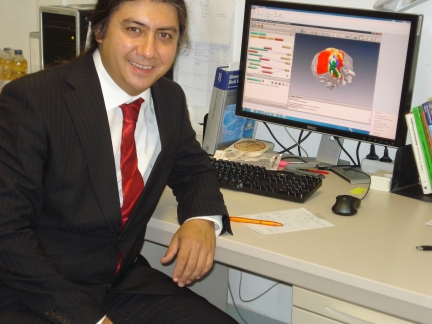 Derzeit absolviert Dr. med. Patrick Dubach am ICCAS sowie an der HNO Universitätsklinik Leipzig ein einjähriges, von der Schweiz finanziertes Fellowship. Der HNO-Spezialist aus dem Berner Inselspital wählte Leipzig für seinen Auslandsaufenthalt im Rahmen des Habilitationsgesuches, um die sehr guten Forschungsbedingungen des Zentrums für Computerassistierte Chirurgie zu nutzen und die seit Jahren bestehende Zusammenarbeit zwischen HNO-Experten der Universitätskliniken Bern und Leipzig zu fördern.
Derzeit absolviert Dr. med. Patrick Dubach am ICCAS sowie an der HNO Universitätsklinik Leipzig ein einjähriges, von der Schweiz finanziertes Fellowship. Der HNO-Spezialist aus dem Berner Inselspital wählte Leipzig für seinen Auslandsaufenthalt im Rahmen des Habilitationsgesuches, um die sehr guten Forschungsbedingungen des Zentrums für Computerassistierte Chirurgie zu nutzen und die seit Jahren bestehende Zusammenarbeit zwischen HNO-Experten der Universitätskliniken Bern und Leipzig zu fördern.
Der gebürtige Berner ist seit 2009 Oberarzt im Inselspital und wurde 2011 zum ärztlichen Leiter der dortigen Poliklinik HNO ernannt. In seinem aktuellen Forschungsprojekt beschäftigt sich Dr. Dubach mit der Planung und Visualisierung von Mittelohr- und Innenohrimplantaten, deren Einsatz mit Hilfe einer Knochendichtekartographie und zunehmend automatisiert endoskopisch erfolgen soll. Studien am Patienten dazu laufen bereits am Leipziger und Berner Universitätsklinikum. Weitere Projekte sind die Schlussredaktion eines Handbuchartikels „Image Guided Therapy“ im Springer Verlag und Studien zu „Computer navigierten Biopsien bei Schädelbasistumoren“.
Dr. Dubach wird am 21. Oktober 2013 im ICCAS-Kolloquium einen Überblick über seine bisherige Forschungstätigkeit geben und seine aktuellen Forschungsprojekte mit dem Referat „Experiments with Image Guided ENT: from Applied Bone Thickness Map to CEUS Fistulography“ vorstellen.
Das ICCAS-Team wünscht dem Schweizer Kollegen eine erfolgreiche und lehrreiche Zeit in Leipzig und freut sich auf eine gute Zusammenarbeit!

Dr. Patrick Dubach is currently completing a one-year fellowship at the ICCAS and the ENT-Clinic an Polyclinic of the University Hospital Leipzig, which is funded by the Swiss government. The ENT specialist from the Inselspital Bern chose Leipzig for his research stay abroad as part of his habilitation application to take advantage of the excellent research conditions of the Center for Computer Assisted Surgery and to promote the long-standing cooperation between ENT experts of the University Hospitals Bern and Leipzig.
The Bern native has been senior physician since 2009 and was appointed medical director of the ENT clinic at the Inselspital in 2011. In his current research project Dr. Dubach deals with the planning and visualization of middle and inner ear implants, their applications are based on a Bone Thickness Map and should be increasingly automated by using endoscopes. Clinical studies with patients are ongoing at the University Hospitals Bern and Leipzig. Other projects include the final editing of the manual article “Image Guided Therapy” at Axel Springer Verlag and studies on “Computer navigated biopsies of skull base tumors.”
Dr. Dubach is giving an overview over his current research on 21 October 2013 at the ICCAS colloquium. The lecture on “Experiments with Image Guided ENT: from Applied Bone Thickness Map to CEUS Fistulography ” will demonstrate his research activities.
The ICCAS team wishes our Swiss colleague a successful and instructive time in Leipzig and is looking forward to a good cooperation.
26.09.2013
 ICCAS folgte Einladung zur Dreiländertagung der BMT
ICCAS folgte Einladung zur Dreiländertagung der BMT

Mit Vorträgen und einer Posterpräsentation war das ICCAS auf der diesjährigen Dreiländertagung der Deutschen, Schweizerischen und Österreichischen Gesellschaft für Biomedizinische Technik in Graz vertreten. Dr. Kerstin Denecke und Michael Unger nutzten die Veranstaltung, um sich mit aktuellen Forschungsthemen im Bereich der Medizintechnik vertraut zu machen und mit Referaten zum wissenschaftlichen Programm beizutragen.
Dr. Denecke veranschaulichte in ihrem Vortrag „Model-based decision support: Requirements and future for its application in surgery“ Ansätze zur chirurgischen Entscheidungsunterstützung, deren Basis digitale Patientenmodelle sind. Die DPM-Forschungsgruppenleiterin ging vor allem auf die wesentlichen Anforderungen ein, die bei der Entwicklung solcher Systeme zu beachten sind. Entscheidungsunterstützende Systeme sollen das Verständnis sowie die Interpretation von Patientendaten unterstützen, um Chirurgen wichtige Entscheidungen vor und während einer OP zu erleichtern.
Michael Unger legte mit seinem Vortrag “Automatic gesture recognition based on thermography” die Ergebnisse seines abgeschlossenen Forschungsprojektes am ICCAS vor. Darin beschäftigte sich der Diplomingenieur mit der Überwachung von Operationen mittels Wärmebildkameras. Wesentliches Ziel der automatischen Gestenerkennung durch Infrarot-Thermografie ist die automatische Erkennung von Workflows als eine Voraussetzung für die Entwicklung von intelligenten Assistenzsystemen.
Prof. Dr. Thomas Neumuth und Stefan Franke stellten in ihrem Poster “A framework for multi-model surgical workflow management“ die Arbeit der MAI-Gruppe im Bereich des chirurgischen Workflowmanagements vor. Im Fokus der Präsentation stand ein Konzept zur Verknüpfung unterschiedlicher Prozessmodelle und ergänzender Module auf der Basis eines Pipeline-Ansatzes.

With lectures and a poster session the ICCAS was represented at this year’s Dreiländertagung der Deutschen, Schweizerischen und Österreichischen Gesellschaft für Biomedizinische Technik in Graz. Dr. Kerstin Denecke and Michael Unger used the event to familiarize themselves with current research topics in the field of medical technology and to contribute to the scientific program through presentations.
Dr. Denecke provided in her paper on “Model-based decision support: Requirements and future for its application in surgery” a vision of model-based surgical decision support systems. The group leader of the reserach area DPM reported mainly about the essential requirements that must be considered when developing such systems. Decision support systems are intended to support the understanding and interpretation of patient data and allow reproducible decisions of high quality before and during an operation.
Michael Unger presented in his lecture “Automatic gesture recognition based on thermography” the results of his completed project at the ICCAS. In this work the engineer dealt with the monitoring of operations by thermal imaging cameras. An important aim of the automatic gesture recognition by infrared thermography is the automatic detection of workflows as an important requirement for the development of intelligent assistance systems.
Prof. Dr. Thomas Neumuth and Stefan Franke presented in their poster contribution “A multi-model framework for surgical workflow management” the work of the research area MAI in the field of surgical workflow management. The focus of the presentation was a concept for the linking of different process models and supplementary modules based on a pipeline-approach.
